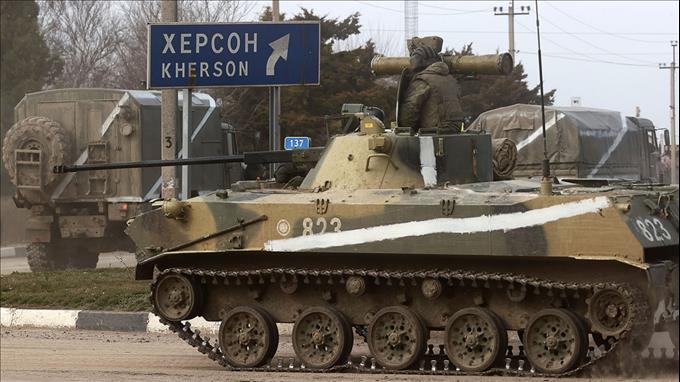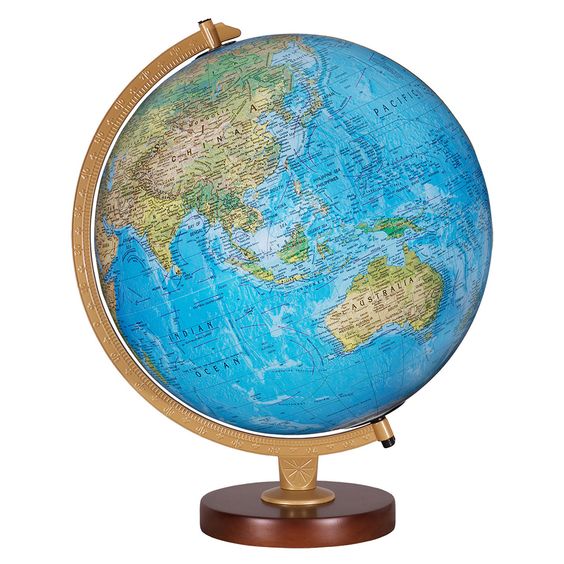
Kherson sits on the west bank of the Dnieper River, 60 miles from the Black Sea. Russian forces have been in control of the city since 2 March, but now the troops are trapped by a Ukrainian counter offensive.
By Tom Arms
Russia and Ukraine are locked in a battle for control of the strategic city of Kherson. It could be a turning point in the Ukraine War.
Kherson sits on the west bank of the Dnieper (also spelled Dnipro) River, 60 miles from the Black Sea. Russian forces have been in control of the city since 2 March, but now the troops are trapped by a Ukrainian counter offensive.
Using American High Mobility Artillery Rocket Systems (HIMARS), the Ukrainians have destroyed virtually all the bridges connecting the city to Russian forces on the eastern side of the river. The more than 1,000 Russians are surrounded on three sides with the river on their fourth. They have been told by Ukrainian generals to either surrender, leave or be annihilated.
Meanwhile, there are reports of Moscow rushing forces across the Crimean bridge linking Russia and the occupied Crimean Peninsula and increased road and rail traffic from Crimea to the eastern bank of the Dnieper. Forces are also being transported to Ukraine from as far away as Vladivostok on the Pacific coast. Putin is clearly preparing for a major battle.
This is unsurprising. Kherson is important to both sides politically and strategically. For a start it sits near the mouth of the Dnieper River with both a sea and river port and a major shipbuilding industry. The Dnieper is the fourth longest river in Europe and flows through Russia, Belarus and Ukraine before emptying into the Black Sea near Kherson. The river is dotted with hydroelectricity plants and ship canals that enable major cargo vessels to travel 1,200 miles upriver to Kyiv and beyond. It is a vital part of the region’s history, culture and economy.
For the Russians, Kherson is also the gateway to the even more important port city of Odessa. And for the Ukrainians, its permanent loss would dash any hope of regaining Crimea to the south.
Unlike Luhansk and Donetsk regions, the majority of Kherson’s 250,000 residents (pre-war figure) are ethnic Ukrainians. It is a narrow majority, 53.4 percent compared to 45.3 percent for ethnic Russians, but in the 1991 independence referendum, 91 percent of the city’s population voted to breakaway from Russia.
By all accounts, Russia’s five-month occupation of the city has not been a happy one. Anti-Russian demonstrations have been brutally suppressed by Moscow successor to the KGB the FSB. Pro-Ukrainian politicians have been detained and two have been killed by car bombs. The puppet regime installed by Moscow has called for a referendum to annex Kherson to Russia. The vote, which has been tentatively scheduled for September, is likely to be successful because most of the ethnic Ukrainians have fled the city.
The battle for Kherson is also a major military challenge for both sides. It is an opportunity for the Ukrainian army to prove that it can mount a successful major counter offensive. It is an opportunity for President Volodomyr Zelensky and his military team to prove to America, Europe and the rest of the world that Ukraine has the martial skills to defeat the Russian military machine and that they are worth the economic sacrifices being made on their behalf.
Vladimir Putin has to prove that he can hold and successfully integrate captured territory. US intelligence reckons that so far 75,000 Russian soldiers have lost their lives in his “special military operation”.
But Russia has vast military resources. This week NATO’s Defense College issued a report ominously entitled “Russia’s Military: Down But Not Out.” The report argued that Moscow is still a long way from utilizing its full military resources, including a general mobilization and mass conscription. Putin said this week: “Russia has only just started.”
 World Review
World Review
- Ukraine and Russia are engaged in a weapons war. The West in Russia are engaged in an economic war of attrition. The West’s main weapon is sanctions. Putin’s main weapons are European dependence on Russian oil and gas, food supplies to millions and the perceived decadence of Western populations. Europe had hoped to build up a reserve of stored gas supplies for the winter by importing as much Russian gas as possible until December. But Putin this week scuppered that plan by cutting piped exports by 80 percent. Germany has stopped lighting public buildings at night and has turned off the hot water in public sports centers. The price of energy is rocketing around the world, fuelling inflation and costing jobs. There is a real prospect of energy rationing in Europe and possibly further afield. But what about Russia? Putin has admitted that Western sanctions are “a huge challenge.” The Mayor of Moscow has said the city has lost 200,000 jobs. Businesses have been forced to close and inflation in Russia is 16 percent. Analysts at Yale University this week reported that “imports have collapsed” and domestic production has come to a “complete standstill.” But here is the rub, Putin believes that Russians are tougher than their European and American counterparts. Western support for sanctions will collapse, Putin believes, when European and American consumers can no longer afford their long car journeys, overheated homes, exotic foods and multiple holidays. It’s a gamble. For both sides.
- US President Joe Biden and his Chinese counterpart Xi Jinping had a two-hour face to face in cyberspace this week. They discussed Ukraine, climate change and lifting some of the Trump era tariffs. But top of the list was Taiwan and the proposed trip to the disputed island by Speaker of the House of Representatives, 82-year-old Nancy Pelosi. The Chinese have vowed “resolute and forceful measures” if the visit goes ahead. The Ministry of Defense has threatened that the “Chinese military will never sit idly by.” In Taiwan, the authorities have been conducting air raid drills. At the heart of the problem is China’s claim of sovereignty over Taiwan and its stated willingness to use force to impose it. To date, however, Beijing’s emphasis has been on diplomatic pressure. It has successfully isolated the Taipei government by hounding other nations to break off relations and blocking Taiwan’s membership of international bodies. Anything that smacks of international recognition of Taiwan is strongly opposed by Beijing, and a visit by a high-profile American politician who is third in line to the presidency is extremely high profile—especially given Ms. Pelosi’s strong anti-Beijing position. She has repeatedly attacked the Chinese Communist Party’s human rights record, entertained the Dalai Lama, unfurled a pro-democracy banner in Tiananmen Square and supported Hong Kong demonstrators. In short, she is not well-liked in Beijing. But there are other problems related to President Xi’s position within the Chinese Communist Party. It is not strong at the moment. He is viewed by many as having badly managed the covid pandemic and China’s response to the war in Ukraine. In October the Party will hold its national congress at which Xi is expected to be voted a third term. It is important that the vote is a general acclamation rather than a mere majority vote. Failure to stand firm on Taiwan—added to covid and Ukraine—could undermine that.
- There was an almost comic moment in a televised debate earlier this week between the two conservative candidates for the British Premiership—Liz Truss and Rushi Sunak. The debate came as tens of thousands of British holidaymakers were stuck in traffic for up to 21 hours to board trains and ferries across the English Channel to France. The contenders were asked if the holiday chaos was the result of Brexit: “No, absolutely not,” was the emphatic reply from both of the Brexiteering Tories. Of course, their answer was a load of rubbish. It had everything to do with Brexit. Pre-2016 French customs officials simply waved British holidaymakers through the immigration channels. There were no checks. They were unnecessary and not legally required. Britain was part of the European Union. It is no longer. It is a third country as far as France and the rest of the EU are concerned. That means that French border officials have to check and stamp all passports. They have to make sure that the passport is valid for at least 90 days. If a family is bringing a pet they need a pet passport and insurance. All of this is the law. It is not—as Brexiteers claim– bloody-minded French officials. The impact of Brexit has been camouflaged by the pandemic. Britons have been unable to travel for two years because of covid restrictions. Now they can and they are learning one of the consequences of leaving EU. Brexit repercussions are also being felt at the airports. Shortage of staff are creating snarl-ups which equal those at the ports and the staff shortages are at least partly caused by the fact that airports can no longer recruit EU labour. The Conservative Mayor for the West Midlands, Andy Street, reluctantly admitted this week that exports from West Midlands have dramatically declined because of Brexit. The wheels on the Brexit bus are coming off. The problem is that the ruling Conservative Party cannot admit it because they are responsible for taking Britain out of Europe. The Government’s refusal to admit that Brexit has created problems makes it difficult for them to solve those problems.
- The battle between Russia and the West for the hearts and minds of Africa was in full swing this week. Russian foreign minister Sergei Lavrov took the initiative with trips to Egypt, Ethiopia, Uganda, and Congo-Brazzaville. The emphasis was on Uganda which is about to assume the rotating chairmanship of the non-aligned movement. Lavrov is pushing for the non-aligned movement to declare itself officially neutral in the Ukraine conflict. He would also like to see a similar resolution at the Russia-Africa summit scheduled for October. Uganda’s Yoweri Museveni appears receptive. Uganda was one of the 17 African countries that refused to back the UN motion condemning Russia’s invasion of Ukraine. But the West is not idly standing by. While Lavrov was on tour, French President Emmanuel Macron was visiting Cameroon, Guinea-Bissau and Benin. The French, however, lost prestige when they pulled their troops out of Mali earlier this year. They have been replaced by Russian mercenaries. The US is also becoming more involved. America’s special envoy to the Horn of Africa is about to embark on a mission to Egypt and Ethiopia and next week Linda Thomas-Greenfield, the US Ambassador to the UN, will be in Uganda and Ghana. The big issue for all these countries is food security in the wake of the Ukraine War. They are all heavily dependent on grain from Russia and Ukraine. The Biden Administration has provided an additional $1 billion in food aid. Lavrov is highlighting the recent shaky deal with Ukraine to move 20 million tons of much-needed Ukrainian grain to African countries as well as Russian wheat to help with any shortfall. Russian weaponry—always useful in Africa– is also on the agenda.
- Slipping under the US news radar this week has been the formation of a third—centrist oriented—political party. It probably has not been widely reported because third parties have chalked up a generally dismal performance in American political history. The party is called Forward and is backed by right-leaning Democrats and left-leaning Republicans. The co-leaders are former Democratic Party presidential candidate Andrew Yang and former Republican Governor of New Jersey Christina Todd Whitman. Their political banner reads: “How will we solve the big issues facing America? Not left. Not right. Forward.” But can it succeed? Forward is up against huge, well-financed entrenched political machines established in every district in each of the 50 states. In the past, the most third parties have achieved is to siphon off votes from one of the two major contenders. Ralph Nader’s Green Party is credited with helping George W. Bush defeat Al Gore in the 2000 presidential elections. Yang and Todd-Whitman claim that the time is ripe for a third party. The Republicans have been captured by the cult of Trump and Democrats are split between left and right and led by an ageing gerontocracy that refuses to relinquish the reins of power. A political chasm has opened in the center ground. A Gallup poll last year reported that two-thirds of Americans wanted a third political party to break the Republican-Democrat duopoly.
_______________
 Tom Arms is foreign editor of Liberal Democrat Voice and author of the recently published “America Made in Britain”. He is currently working on a rewrite of his “Encyclopedia of the Cold War.”
Tom Arms is foreign editor of Liberal Democrat Voice and author of the recently published “America Made in Britain”. He is currently working on a rewrite of his “Encyclopedia of the Cold War.”